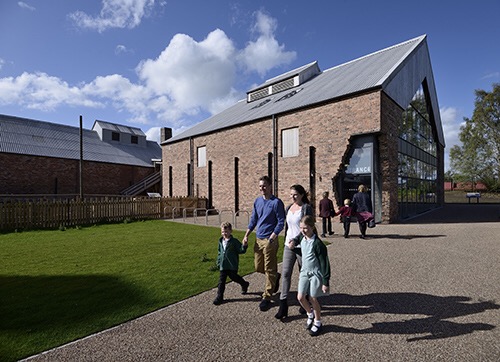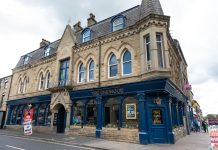Salt-making in Cheshire dates back over 2,000 years, when the salt towns of Cheshire were first established by the Romans.
Now a new museum has opened which marks the end of a four-year, £10.23m project by Cheshire West and Chester Council to restore the crumbling 19th century buildings, one of the last three historic open-pan salt-making sites in the world.
The Lion Salt Works Museum won the Heritage Award at the prestigious 2015 North West Regional Construction awards and was praised for its exemplary heritage restoration, local regeneration, use of traditional materials and materials and for the number of people trained in heritage skills required to make this project outstanding.
Councillor Brian Clarke, Cabinet Portfolio Holder for Economic Development and Infrastructure, Cheshire West and Chester Council, said: “This restoration has been truly painstaking but it has been worth it. The feel of the site, as it would have been, is recreated through walls that bulge, original beams and the use of craftsmanship that has, in many cases, had to be re-learnt. The result is a triumph that will be enjoyed for decades.”
Visitors to the museum will discover how the salt works operated and the impact of salt on mid-Cheshire’s people, economy and landscape. A visit will also set the scene for a wider exploration of the footpaths, waterways and attractions of the adjacent Northwich Woodlands (a 350 hectare area of vibrant and accessible parkland) and the wider Weaver Valley including the Anderton Boat Lift.
Originally salt was extracted from the ground by a series of natural brine pits. In the 17th century the first of a series of mines were begun in the Northwich region but were exhausted around 1850. The exhaustion of the mined rock salt supplies resulted in a change to wild brine pumping. The brine was pumped out of the ground to supply the salt works based at the surface. By the late-19th century brine shafts and traditional open pan salt works dominated the area around Northwich, many controlled by the monopolistic Salt Union.
In 1856 John Thompson Senior and John Thompson Junior constructed the Alliance Salt Works on the eastern side of the Lion Salt Works site. The Thompson family sold the Alliance Salt Works to the Salt Union and it closed around 1900.
In 1894, Henry Ingram Thompson, constructed a new salt works that became known as the ‘Lion Salt Works’. The new company quickly built a series of pan and stove houses. The salt works ran on the site for almost 100 years. The outbreak of the Nigerian Civil War saw the loss of a major market in West Africa and the eventual closure of the works in June 1986.
Lion Salt Works Ollershaw Lane
Northwich Cheshire CW9 6ES
01606 275040
http://lionsaltworks.westcheshiremuseums.co.uk/visit-us/







